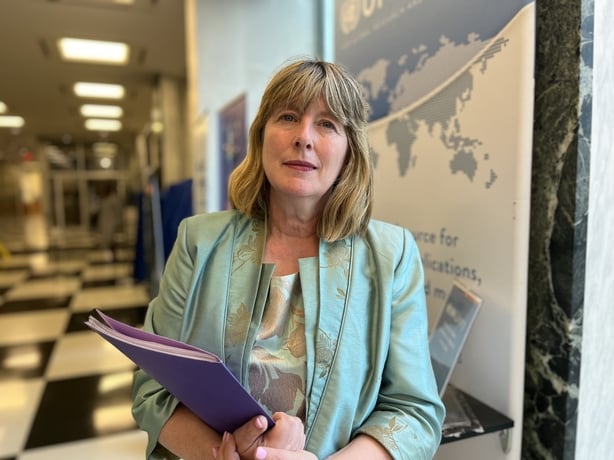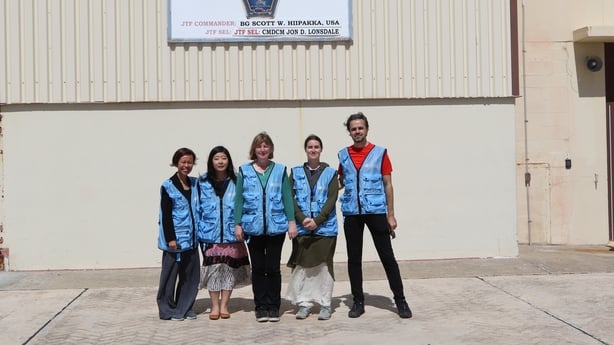A United Nations human rights envoy has issued a damning assessment of the US-run detention facility at Guantanamo Bay over "sustained human rights violations" and "ongoing cruel, inhuman and degrading treatment," following a long-awaited UN visit in February.
The Irish academic, Fionnuala Ní Aoláin, who is the UN's Special Rapporteur on human rights and counter-terrorism, is the first UN expert ever to be granted access to the site.
Her report, issued at UN Headquarters in New York yesterday, called on the US government to close the site and compensate detainees for their mistreatment.
The rights of the victims of terrorism had also been "seriously compromised", Ms Ní Aoláin told RTÉ News, because the use of torture at Guantanamo Bay undermined the ability of the families of the victims of the 9/11 attacks to seek redress through the courts.
"As well as the profound harm caused to the men who were tortured, you simply cannot, under international law, use torture-induced evidence in any legal proceeding," she said.
"Torture was a betrayal of their rights," she added.

According to the report, detainees were subject to waterboarding, walling (repeated slamming against a wall), deprivation of food, water and sleep. Men were violently slapped, shaken, subject to mock executions and sexual violence and told that harm would come to their families.
"The US government authorised and justified, and personnel enabled and sustained their torture," the report concluded.
The Special Rapporteur said the report was in three parts - on the rights of victims of terrorism, the rights of current detainees at Guantanamo Bay, and the rights of former detainees.
Ms Ní Aoláin, who is a professor of law at the University of Minnesota and Queen's University Belfast, said she and her team had carried out extensive interviews with members of all three groups.
In every meeting with a detainee or former detainee, Ms Ní Aoláin reported she was told "with great regret" that she had arrived "too late".
Asked by RTÉ News why it has taken so long for the UN to visit the site, Ms Ní Aoláin said previous US administrations had not allowed it.
She said it was the current US administration under President Joe Biden that had "through a process of discussion and engagement" enabled the visit.
"It is the very first administration to allow access," she said.
"That said there is a much smaller number of men at the detention facility now then there were in years past when other human rights experts sought access."
Today, there are 30 men at the site, down from 780 in previous years. The facility in Cuba began operating in 2002 as part of the US-led "war on terror" launched in the aftermath of the 9/11 attacks, which killed nearly 3,000 people.
Hundreds of Muslim men were rendered across borders, forcibly disappeared, held in secret detention and subject to egregious human rights violations, according to the report.
The Special Rapporteur said she was granted access to both "high value" and "non-high value" detainees.
Ms Ní Aoláin noted that specialist medical care at the facility for the ageing detainees was inadequate.
She called on the US government to provide torture rehabilitation programs for current and former detainees, who she said were living with the lifelong physical and psychological affects of torture, as well as the stigma attached to detention at Guantanamo Bay.

The Special Rapporteur noted "with profound concern," that 19 of the remaining detainees had never been charged with a crime, in some cases after 20 years in detention in US custody.
In its formal response, the US mission to the UN said that that they were "gratified that (the Special Rapporteur) acknowledges our openness, transparency and leadership by example, as well as our ongoing commitment to upholding human rights".
The statement said that the US authorities had granted access "with confidence that the conditions of confinement at Guantanamo Bay are humane and reflect the United States' respect for and protection of human rights for all who are within our custody".
The US disagreed "in significant respects with many factual and legal assertions," in the report, the written submission stated.
"We are committed to providing safe and humane treatment for detainees at Guantanamo, in full accordance with international and US domestic law. Detainees live communally and prepare meals together, receive specialised medical and psychiatric care and are given full access to legal counsel and communicate regularly with family members," it said.
But the US mission said that they were reviewing the recommendations made in the report and would "take appropriate actions, as warranted."
Ms Ni Aolain called on the US government to make reparations to the detainees and ensure accountability for all violations of international law.
She praised the US authorities for their willingness to "lead by example".
"The precedence of non-access to Guantanamo has now been broken" she told reporters, adding that member states should expect that UN human rights experts should be given access to other sites of detention.
But she also warned that there is no statute of limitations for torture.
"Torture has the persistent capacity to be what we might call 'sticky', meaning that those perpetrated it, engaged in it, concealed it, authorised it, remain liable for the entirety of their lives," she said.
Asked by RTÉ News whether the existence of Guantanamo Bay undermined UN foreign policy when it came to criticising other UN member states over human rights violations, Ms Ní Aoláin said the costs for the United States have been high.
"When a state speaks about human rights but is engaged in human rights violations, other states will remind them of those obligations, often not so politely," she said.
But proponents of Guantanamo Bay argued that it was justified in the context of the 9/11 attacks and the ongoing terror threat that the US faced.
"I would go back to 1970 in Northern Ireland when the British government talked about the necessity of internment because it was facing a serious threat, as it described it," Ms Ní Aoláin told RTÉ News.
"What it did was round up a large number of men who were simply Catholic and who were deemed to be suspect by virtue of their gender identity and their religious belief and it locked those men up without trial," she said.
"No one in in Ireland or the UK, would say that was a successful adventure. In fact, what it did in Ireland was to lay the seeds for 30 years of conflict."
A parallel can be drawn with Guantanamo Bay, she said, which did not make the US safer or more secure.
"It undermined the rule of law basis for the fight against terrorism and that sets us all back," she said.







